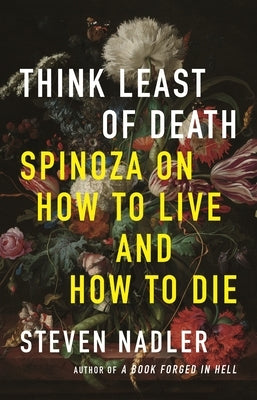1
/
of
1
Princeton University Press
Think Least of Death: Spinoza on How to Live and How to Die
Think Least of Death: Spinoza on How to Live and How to Die
Regular price
$29.95 USD
Regular price
Sale price
$29.95 USD
Shipping calculated at checkout.
Quantity
Couldn't load pickup availability
From Pulitzer Prize-finalist Steven Nadler, an engaging guide to what Spinoza can teach us about life's big questions
In 1656, after being excommunicated from Amsterdam's Portuguese-Jewish community for "abominable heresies" and "monstrous deeds," the young Baruch Spinoza abandoned his family's import business to dedicate his life to philosophy. He quickly became notorious across Europe for his views on God, the Bible, and miracles, as well as for his uncompromising defense of free thought. Yet the radicalism of Spinoza's views has long obscured that his primary reason for turning to philosophy was to answer one of humanity's most urgent questions: How can we lead a good life and enjoy happiness in a world without a providential God? In Think Least of Death, Pulitzer Prize-finalist Steven Nadler connects Spinoza's ideas with his life and times to offer a compelling account of how the philosopher can provide a guide to living one's best life. In the Ethics, Spinoza presents his vision of the ideal human being, the "free person" who, motivated by reason, lives a life of joy devoted to what is most important--improving oneself and others. Untroubled by passions such as hate, greed, and envy, free people treat others with benevolence, justice, and charity. Focusing on the rewards of goodness, they enjoy the pleasures of this world, but in moderation. "The free person thinks least of all of death," Spinoza writes, "and his wisdom is a meditation not on death but on life. An unmatched introduction to Spinoza's moral philosophy, Think Least of Death shows how his ideas still provide valuable insights about how to live today.Author: Steven Nadler
Publisher: Princeton University Press
Published: 09/22/2020
Pages: 248
Binding Type: Hardcover
Weight: 1.00lbs
Size: 8.60h x 5.80w x 1.20d
ISBN: 9780691183848
About the Author
Steven Nadler is the author of many books, including Rembrandt's Jews, which was a finalist for the Pulitzer Prize, Spinoza: A Life, which won the Koret Jewish Book Award, and A Book Forged in Hell: Spinoza's Scandalous Treatise and the Birth of the Secular Age (Princeton). He is the William H. Hay II Professor of Philosophy and Evjue-Bascom Professor in the Humanities at the University of Wisconsin-Madison.
Share


